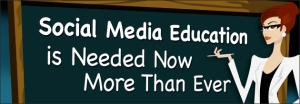 Social media tools and approaches, based on Web 2.0 paradigm, offer educational possibilities in so far as they can support social interaction such as sharing and exchanging information and views, collaborating, and communicating. Therefore, here are some of the ways social media and social learning can contribute to social work and social care education and CPD.
Social media tools and approaches, based on Web 2.0 paradigm, offer educational possibilities in so far as they can support social interaction such as sharing and exchanging information and views, collaborating, and communicating. Therefore, here are some of the ways social media and social learning can contribute to social work and social care education and CPD.
Curating
Social workers are expected to take responsibility for their own training and development and this is embodied in HCPC’s CPD requirements where instead of hours and days, professional development is measured based on competency and outcome. This truly enables professionals to take responsibility for their own learning and development.
However, in a world where the answer to every question is a Google away and where the cacophony of opinions, misinformation and disinformation crowds every computer search, it is the art of curating and the ability to dynamically sieve through data, to separate substance from superfluous and the relevant from irrelevant, that is an essential skill for professionals.
Social constructivism and social learning through shared meaning making
Social constructivism, a widely appreciated and accepted theory among educators, tells us that knowledge is constructed within social context. This definition of knowledge has significant implications for all professions and professionals.
From a theoretical vantage point, blending social media and innovative technologies such as Web 2.0 platforms with social work and social care pedagogy result in a strong application of many of the tenets of social constructivism.
An important tenet of social learning is the collaborative construction of knowledge based on learning that goes beyond memorisation of information, and social media can greatly facilitate this process. Social learning is situational allowing individuals to learn from a given situation by finding solutions or generating meaning relevant to that context. This makes social learning contextual, relevant and meaningful to the learner’s “reality”. Furthermore, by sharing this situational meaning/learning, the learner is able to engage in an open exchange with others which can lead to greater understanding and a shared meaning that goes beyond what could be achieved by the individual learner while embracing and encompassing his/her meaning and experience.
A learner-lead and learner-centred experience that recognises practice wisdom
Social learning facilitated by social media inverts the paradigm of teacher-lead instructional learning to an inquiry-based experiential and participative problem solving approach which prioritises the learner’s experience and places the learner at the centre of learning. This makes learning purposeful and intentional by enabling learners to define their own needs and cognitive objectives and work toward fulfilling them.
The recognition of learners’ experience as a source of knowledge and an important contributing factor to learning outcomes, facilitates the valorisation of practitioners’ knowledge and practice wisdom. Furthermore, the situational and experiential pedagogy of social learning enables learners to explore their zone of proximal development and to learn through Vygovsky’s scaffolding by building on one another’s knowledge and expertise. This greatly facilitates the learning process as students are able to build and expand on what they know and to locate their learning situationally and in relation to their own experience.
Social media and the opportunity to reclaim the values of critical pedagogy
During the 1970s, with the emergence of knowledge economy and the increasing globalisation of national agenda for education, lifelong education was displaced by ‘vocationalism’ and lifelong learning.
A discussion around the meaning of education and learning are beyond the scope of this article, however, lifelong education may be understood as enabling an individual to be more critical and socio-political, while lifelong learning as defined by UNESCO relates to an enabling process to develop individuals who are able ‘to do’, ‘to be’, ‘to understand’ and ‘to live together’.
The situational and experiential aspects of social learning respond to the needs of a lifelong learning, while the new possibilities generated by social media enable us to reclaim the values of lifelong education.
Wikis, blogs, chats, and other social tools are some of the possible ways of integrating social learning into e-learning in both constructivist and collaborative sense. Research indicates that peer interaction in social context can lead to enhancement of learning process through more effective meaning construction based on a shared understanding/meaning than traditional pedagogies based on teacher-oriented instruction and memorisation.
The sociality and sociability aspects of social media are seen as having “… the most potential for enhancing education”. In fact, using social media tools supports a more student-centred learning experience.
Social media offer social work and social care practitioners the opportunity to reclaim power and values of Freire’s critical pedagogy through creation of new spaces for dialogue that challenge and displace rigid structural hierarchies that serve as the apparatus of power and constrain and construct all actions.
Claudia Megele (@ClaudiaMegele) is the founder of @SWSCmedia and @MHchat Senior Lecturer and module leader University of Hertfordshire and has published her work with various publishers including Cambridge Scholars Publishers, Palgrave Macmillan, Sage Publications and others.

3 thoughts on “Social Media, Social Learning and Education + CPD – By Claudia Megele (Originally published in Compass)”